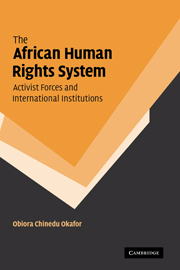Book contents
- Frontmatter
- Contents
- Acknowledgements
- List of abbreviations
- 1 The African human rights system, activist forces, and international institutions: an introduction
- 2 Conventional conceptions of international human rights institutions
- 3 Conventional conceptions of the African system for the promotion and protection of human and peoples' rights
- 4 The impact of the African system within Nigeria
- 5 The utilization of the African system within South Africa
- 6 Limited deployment of the African system within African states: further evidence and a general evaluation
- 7 Toward an extended measure of IHI effectiveness: a quasi-constructivist perspective
- 8 Conclusion
- Select Bibliography
- Index
1 - The African human rights system, activist forces, and international institutions: an introduction
Published online by Cambridge University Press: 17 July 2009
- Frontmatter
- Contents
- Acknowledgements
- List of abbreviations
- 1 The African human rights system, activist forces, and international institutions: an introduction
- 2 Conventional conceptions of international human rights institutions
- 3 Conventional conceptions of the African system for the promotion and protection of human and peoples' rights
- 4 The impact of the African system within Nigeria
- 5 The utilization of the African system within South Africa
- 6 Limited deployment of the African system within African states: further evidence and a general evaluation
- 7 Toward an extended measure of IHI effectiveness: a quasi-constructivist perspective
- 8 Conclusion
- Select Bibliography
- Index
Summary
Aside from their weak attempts at commanding obedience and their very modest successes at cajoling compliance, are there other significant ways in which international human rights institutions (IHIs), such as the African human rights system, can matter to those who wage domestic social struggles? Aside from doing something for the local activist forces that wage such struggles, can such activist forces do meaningful things with the African system in their engagement with the domestic institutions of their own countries? Can these activist forces, as local actors and agents, more effectively deploy and harness within states the norms, processes, and creative spaces that have been made available to them partly as a result of the character and behaviour of the African system? Can they by so doing facilitate a creative form and process of “trans-judicial communication” between the African system and such other IHIs (on the one hand) and the key domestic institutions (on the other hand)? In short, what precisely, if at all, is the extent of the domestic impact of the African system; how exactly has such domestic impact been achieved; and what does the manner in which it has been achieved tell us about the ways in which we imagine and evaluate IHIs like the African system?
A number of concepts are central to the questions raised above: the African human rights system, activist forces, IHIs, and trans-judicial communication. These require definition.
- Type
- Chapter
- Information
- Publisher: Cambridge University PressPrint publication year: 2007

